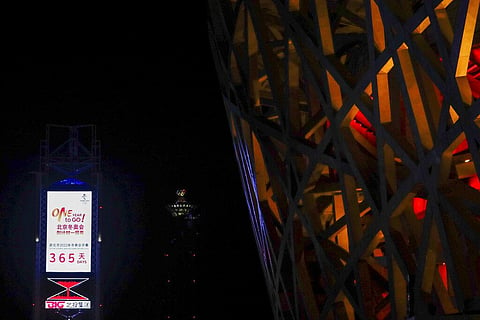

BEIJING: China presented its newly completed Olympic ski venue as an example of its commitment to making the Beijing Games the greenest and cleanest in history, but it was built in the middle of a nature reserve.
Chinese organisers said that the National Alpine Ski Center in Yanqing, about 90 kilometers (56 miles) from central Beijing, will be 100 percent powered by wind and solar energy, but according to satellite images and official maps analyzed by CNN, the ski center is built in the former core area of Songshan National Nature Reserve, a park founded in 1985 to protect its dense forests, alpine meadows and rich biodiversity.
This apparent conflict with Beijing's green narrative comes amid mounting questions about the environmental cost of the Games. Given the city's arid climate, it will rely entirely on artificial snow , which experts warn would be a drain on energy and water resources, reported CNN. And such environmental concerns won't end with the Olympics. As the Chinese government looks to turn Yanqing into an international skiing hotspot and build more ski slopes, conservationists fear it could cause further damage to the local ecology.
For decades, Songshan National Nature Reserve provided a sanctuary to many protected animal and plant species, including the golden eagle and rare orchids. Under Chinese law, nobody is allowed to enter the reserve's core area, except for scientific research with government approval.
A 2007 planning document obtained by CNN made it clear that development within the core area at Songshan was forbidden. So when Beijing won the bid to host the 2022 Winter Olympics, conservationists and nature enthusiasts were shocked to find that the proposed alpine ski site fell exactly within the reserve's core area on the Xiao Haituo mountain, the second-highest peak of Beijing.
The discovery sparked an outcry on social media, with many internet users questioning why the Olympics venue had to be built inside a nature reserve. Censors soon moved in, deleting viral posts that drew hundreds of thousands of clicks, but that only further fuelled the anger, reported CNN.
As pressure mounted, Zhang Suzhi, then executive deputy head of Yanqing county, told state newspaper the Beijing Daily in 2015 that the boundaries of the Songshan National Nature Reserve had been redrawn, and the Winter Olympic venues did not fall inside the reserve. Chinese experts and environmental activists said that expanding the reserve doesn't compensate for the loss of the original core area, reported CNN.
"This is really a great pity, because (the original core zone) is one of the very few places in northern Beijing that has alpine meadows," said a Chinese ecological expert, who asked not to be named for fear of repercussions. "Such a unique ecosystem was why it was included in the original nature reserve in the first place."
Xiao Haituo mountain in the reserve was chosen to be the site of the Winter Olympic ski events because of its vertical drop of 900 meters (2,952 feet) making it an almost perfect location for what is now one of the world's steepest ski runs.
Beijing's ambitions for Yanqing are not limited to the Olympics. It has already announced plans to turn the region into an international skiing destination by the end of 2024. The goal is to expand its ski slopes to 100 hectares and welcome more than half a million visitors a year, reported CNN.
The future remains uncertain. If Yanqing's ski slopes continue to expand, analysts say it could threaten the surrounding ecosystems ,including the existing nature reserve.